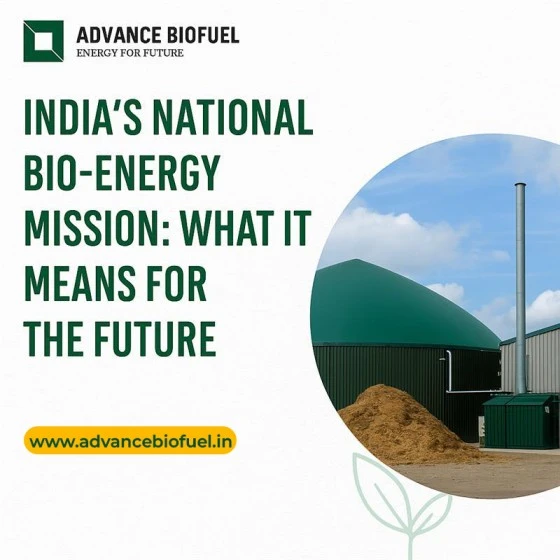Advance Biofuel, a leading biofuel manufacturer in India, stands at the forefront of the nation’s green energy transition. With India’s ambitious National Bio-Energy Mission (NBEM) and evolving government policy on biofuels, the future of renewable energy in India looks promising, sustainable, and full of opportunities. Let us explore what the National Bio-Energy Mission 2025 envisions, how biofuel targets are shaping industries, and why companies like ours are key players in this journey.
Understanding India’s National Bio-Energy Mission
The National Bio-Energy Mission, launched by the Ministry of New and Renewable Energy (MNRE), is a strategic initiative aimed at promoting power generation and energy security through the use of biomass, waste, and biofuels. India is blessed with vast agricultural residues, forest waste, and municipal solid waste, all of which have enormous untapped potential to generate clean energy.
Under NBEM Phase-II, the focus is on setting up grid-connected biomass power projects, bagasse-based cogeneration in sugar mills, and advanced biofuel plants. The aim is not only to reduce carbon emissions but also to decrease dependence on imported fossil fuels, thereby saving valuable foreign exchange and creating rural employment opportunities.
National Bio-Energy Mission 2025 – Key Goals
The government’s vision for NBEM 2025 includes:
- Expanding bio-power capacity: Adding thousands of megawatts from biomass, bagasse, and waste-to-energy plants.
- Promoting advanced biofuels: Ethanol, biodiesel, compressed biogas (CBG), and second-generation (2G) biofuels.
- Encouraging rural entrepreneurship: Farmers can supply biomass residues, creating additional income streams.
- Driving sustainability: Reducing stubble burning, mitigating waste problems, and improving air quality.
At Advance Biofuel, we align our manufacturing and supply chain with these goals. As a trusted biofuel supplier, we support industries, transport sectors, and power plants with high-quality, eco-friendly fuels.
Government Policy on Biofuels – A Supportive Framework
India’s National Policy on Biofuels (2018, updated 2022) is the backbone of this transformation. It provides clear incentives, blending targets, and tax benefits to accelerate adoption.
Some highlights include:
- Ethanol Blending Programme (EBP): The government aims to achieve 20% ethanol blending in petrol by 2025. This move will drastically cut oil imports and emissions.
- Biodiesel Production: Policies encourage biodiesel from non-edible oilseeds, used cooking oil, and waste.
- Viability Gap Funding (VGF): Financial support for setting up second-generation bio-refineries.
- Sustainable Aviation Fuel (SAF): Pilot projects for green aviation fuel are underway.
With such a proactive renewable energy policy in India, companies like Advance Biofuel find the right environment to innovate, expand production capacity, and deliver world-class biofuels.
Why Biofuel Targets in India Are a Game Changer
The biofuel targets announced by the government are not just numbers; they are catalysts for a greener future· By 2025, India aims to:
- Produce 20% ethanol-blended petrol, saving billions of dollars in imports.
- Increase biodiesel usage in heavy vehicles and industries.
- Promote compressed biogas plants through initiatives like the Sustainable Alternative Towards Affordable Transportation (SATAT).
These targets create a ripple effect across multiple sectors: agriculture, transportation, manufacturing, and waste management. For instance, stubble that once went up in smoke can now be a raw material for bioenergy plants, reducing pollution and benefiting farmers.
How Advance Biofuel Contributes to This Vision
As a leading biofuel manufacturer in India, Advance Biofuel takes pride in being a part of this transformative mission. Here’s how we contribute:
- Innovative manufacturing: We deploy state-of-the-art technology to produce high-grade biodiesel, ethanol, and other green fuels.
- Sustainable sourcing: Our feedstocks come from agricultural waste, used cooking oil, and other non-edible resources, ensuring zero competition with the food supply.
- Quality assurance: Every batch undergoes rigorous quality checks to meet national and international standards.
- Partnership with industries: We supply to transport companies, manufacturing units, and energy plants, helping them reduce their carbon footprint and meet compliance targets.
- R&D investments: Our research teams constantly innovate to improve yields, reduce emissions, and develop next-generation fuels.
The Broader Impact of Renewable Energy Policy in India
India’s aggressive push for renewable energy is not limited to biofuels alone· Solar, wind, and green hydrogen also play vital roles. However, bioenergy is unique because it directly involves rural communities, creating a circular economy.
- Environmental benefits: Lower greenhouse gas emissions, reduced air pollution, and better waste management.
- Economic growth: Jobs in rural areas, new industries, and increased farmer incomes.
- Energy security: Less dependence on volatile global oil markets.
A Sustainable Future
The National Bio-Energy Mission 2025 is not just a policy document; it’s a roadmap for a cleaner, greener, and more self-reliant India. By integrating biofuels into mainstream energy consumption, India is setting a global example of sustainable growth.
For businesses and industries, now is the time to adapt and align with this green revolution. By choosing reliable partners like Advance Biofuel, you not only comply with evolving regulations but also contribute to building a better future.
Conclusion
India’s renewable energy policy and biofuel targets are accelerating the shift towards sustainability. The National Bio-Energy Mission is a testament to the government’s commitment and the industry’s readiness to innovate.
At Advance Biofuel, we are proud to lead the way in manufacturing world-class biofuels that empower industries, support farmers, and protect the planet. Together, let’s drive India toward a future where every drop of fuel counts towards a cleaner tomorrow.


